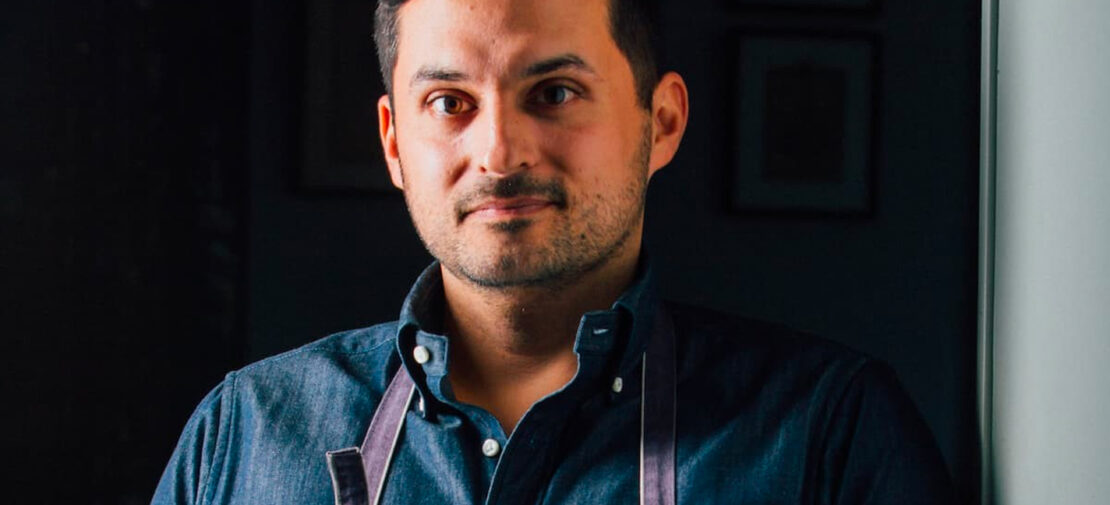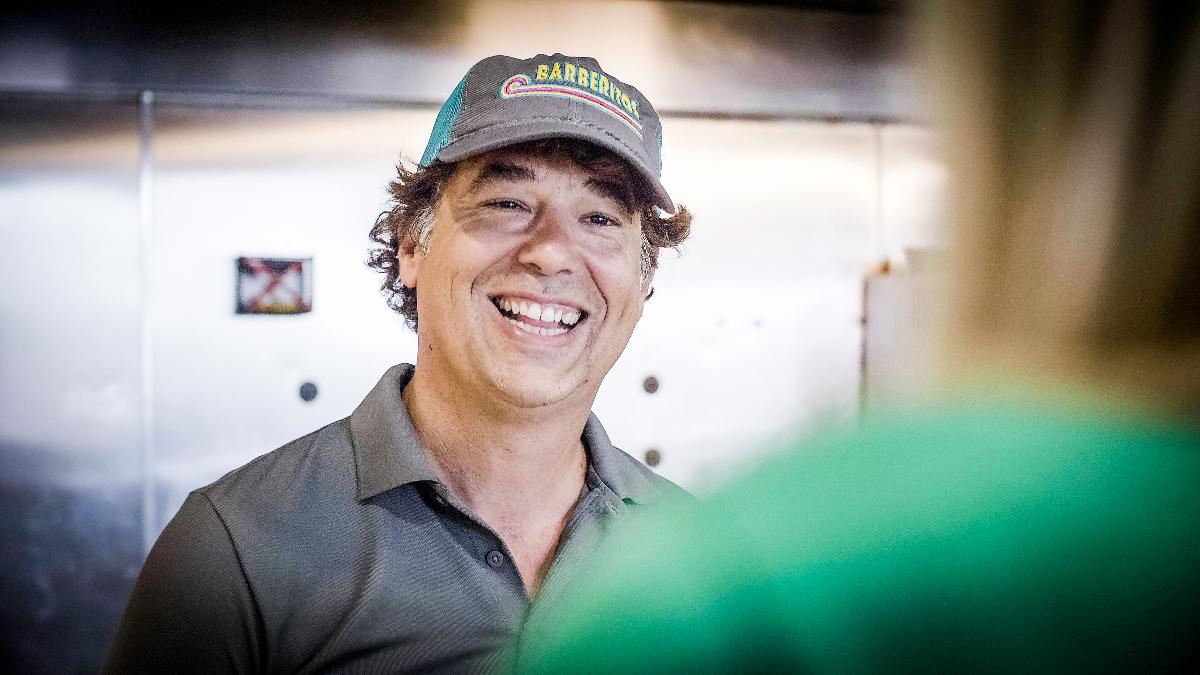
Eating is natural, but cooking is a cultural activity.
When we transform the raw materials we hunt, forage, and cultivate into fare we share around tables, we engage in a quintessentially human pursuit. Every delicacy you’ve ever consumed originates in this metamorphosis.
Over time, developing foodways, migrations, and exchange networks introduce teeming variety. Today’s movement of populations and commodities herald the dawn of a truly global cuisine. If cooking is cultural, we’re inhabiting a cosmopolitan moment.
Few understand this changing terrain better than Athens restaurateur Peter Dale. From rich multicultural origins to helming four influential ventures, Dale’s own life reveals how food represents more than just a good meal on a plate. It’s also a portal for encountering the world. His establishments cater not just to diners’ palates, but to fundamental human needs: rootedness, exploration, community, and convenience.
Fittingly, Dale’s story begins with a journey. A Peace Corps recruit backpacking up the Andean spine of South America introduces himself to a beautiful Ecuadorian woman. It’s the kind of meet-cute you’d get if copywriters for the J. Peterman catalog produced Hollywood scripts. A romance burgeons from this chance encounter, facilitated by his Spanish fluency and her conspiring family in New York. They marry, have children, and relocate to Athens, where he lectures at the University of Georgia.
This hemispheric love affair, of course, is the narrative of how Dale’s parents met each other, and it highlights the interplay of international and local in his formation. He grew up going to his neighbor’s house, where traditional Southern fare with homegrown ingredients was served, but also summering in Ecuador with family. His home provided the site for many receptions his dad organized for international graduate students. Although Dale didn’t have much interest in cooking at the time, the concept of preparing food as an act of hospitality made an impression on him at an early age. It’s a lesson that continues to inform the welcoming confines of his restaurants years later.
In school, Dale gravitated to social studies. The complex dynamics of how human communities interact and change over time fascinated him. He went into politics, working for a Congressman for a while. Although he believed in what he was doing, he found himself more excited by the prospect of going out with friends after work than shuffling papers and answering phones. A big part of that night life was dining well, but again, sharing a meal was mostly a venue for social engagement, not gastronomic exploration.
He returned to Athens to work with students at UGA. He liked being around their energy — a trait that has served him well as a proprietor in this university town — but his stint in higher ed further convinced him he wasn’t cut out for the tedium of desk work. He wanted stimulation and social interaction; he preferred to stay on his feet and work with his hands. But he wasn’t sure what vocation could deliver on all these fronts.
By chance, he joined a friend for dinner at Five and Ten, and ended up talking at length with the founder, Hugh Acheson. Then an enterprising young chef, Acheson was bringing inventive, locally-sourced fare to the Classic City. It’s easy to forget how novel this concept was at the time. Today, Acheson is a celebrity chef and farm-to-table has become as ubiquitous as craft breweries. But at the time, it represented a risky departure from the conventional wisdom. Rather than anchoring the menu with crowd-pleasing favorites, Acheson varied entrees based on what fresh local produce he could find that day. Loyal customers — and even the waitstaff — might not know what would be available on the menus he’d pull from the printer moments before opening until they arrived. It was a calculated risk, but one that ended up injecting the Athens food scene with a new energy.
His engaging conversation with Acheson inspired Dale to present the up-and-coming chef with a question. The atmosphere was electric — fast-paced, creative, and fun. It seemed like just the kind of place where he might thrive. Would Acheson let him shadow the staff to see what it was like in the kitchen?
Acheson consented, launching Dale on a new career trajectory, and fostering a lasting relationship between the two (Dale continues to maintain a stake in Five and Ten, and helped launch Empire State South; Acheson co-founded The National). The night Dale spent behind the scenes at Five and Ten was an epiphany. He was on his toes from the moment he walked through the doors, but he loved the stimulation and challenge of the restaurant life. He also came to enjoy camaraderie with the other line cooks and waiters. They’d push themselves — and each other — all night, then unwind with food, drinks, and laughter around the bar once they’d closed. Unbeknownst to anyone at the time, the Five and Ten staff would reshape the food scene around Athens and the Southeast. Dale rubbed shoulders with Mimi Maumus of home.made, Shae Sims at Donna Chang’s, Whitney Otawka from Greyfield Inn on Cumberland Island, and Dean Neff of Wilmington’s Seabird. This talented cadre of chefs developed their skills under Acheson’s tutelage and soon formed an influential diaspora of regional tastemakers.
His stint at Five and Ten served as a kind of apprenticeship, and Dale’s star rose with Acheson’s. In 2002, Food and Wine named the restaurant’s founder one of the best chefs in the United States. Just as Dale was finishing his informal education in cookery — training he supplemented with a number of stages (short-term cooking apprenticeships) in America and in Spain — his mentor was cementing a national reputation.
The student was ready for something new, and in 2007, Acheson and Dale opened the doors of The National, a Mediterranean-inspired venture in the heart of downtown Athens. They weathered some early challenges, Dale recounts — particularly the popular equation of “Mediterranean” with “Italian”. “That was the one national cuisine we didn’t feature at the time,” Dale tells me. “I wanted the menu to reflect dishes from all my travels in the region.” Spain, not Italy, occupied the restaurant’s center of gravity. But once diners recovered from their confusion, they embraced the new institution. Their attachment has made the restaurant more than a venue to eat; it’s become a gathering place for generations of Athenians. Dale tells me of one couple who dines at the bar every Friday, and of the legions of parents who return on weekends to eat with their children while they’re studying at the university. “We consider them like family,” he says.
His reputation solidified at The National, Dale has taken up the mantle of leadership, mentoring younger chefs and collaborators. A sous-chef at The National, Patrick Stubbers, caught his eye. Once Dale had taught him everything he knew, they decided it was time for the younger chef to strike out on his own, with the owner a silent partner in the new venture. Their establishment, Seabear, offered tribute to their shared love of fresh oysters and seafood fare. On the surface, it was a daring concept in landlocked Athens. But Dale knew that good supply chains can maintain freshness over distance. Ensconced in a cozy niche of the Bottleworks complex, Seabear radiates the same warmth of its parent establishments, with animated conversations reverberating throughout the exposed brick interior and at outdoor tables into the courtyard below.
Another progeny of The National was born closer to home. On a trip to see family in Ecuador, Dale decided to pick up some chocolate to put in the break room for employees. “Ecuador’s cacao is the best in the world,” he avers. “Visiting during the summer when I was growing up, eating the chocolate there was always a special treat.” But this time, he could only surface Mars bars in his favorite marketplace. Globalizing conglomerates were squeezing out the craft chocolatiers who had prepared the sweets of his childhood.
If this finding disappointed Peter Dale, it galvanized his brother, Nick. Always a tinkerer who spent hours customizing bikes and building contraptions, Nick fashioned his own chocolate-making equipment to process the raw cacao he had started bringing back from trips to Ecuador. What began as a hobby became an obsession. Soon, he had honed his craft to a level where he felt comfortable cashing in the savings from his day job to go all-in on a boutique cafe specializing in artisan chocolate. Peter partnered with his brother to bring Condor to Athens. It made an immediate splash, with visitors streaming into its bright shopfront in Five Points from its opening to the present.
Observers imagine chefs preparing themselves sumptuous feasts at home, but as Dale tells it, the reality is far less glamorous. “Most days tending to my restaurants, I was eating takeout in my car.” He was fortunate enough to be able to box up his restaurants’ food, but the choices available to most Athenians dismayed him. He also wanted to provide high-quality food at a different price point than The National and Seabear. Gradually, he developed the vision for Maepole, which offered convenient, healthy options at an inexpensive price. In 2018, he carved out a sunny spot on Chase Street for his newest venue. Judging by the lunchtime crowds I see most weekdays driving by, Maepole has proven an unmitigated success.
COVID-19 disrupted the rhythms of Dale’s operations, but he’s taken advantage of the slower pace to reflect on where he wants to go next. Each institution’s response to the pandemic has been different. Maepole adapted so seamlessly to the new landscape that Dale is already planning a second location in Atlanta. Designs for a downtown Condor with cutaway views so passersby can see artisans fashioning the chocolate are also in the works — and are becoming more important now that the Chase Street Factory (the site where Condor makes its chocolate; the playful name Nick and Peter adopted for the space alludes equally to Willy Wonka and Andy Warhol) is barely able to keep pace with demand. Seabear and The National have navigated rougher waters, following public health prescriptions for protecting staff and guests and promoting takeout options. Dale was skeptical that any patrons would pay full freight for meals to go, but he’s been cheered by the continued support Athenians have shown for his establishments.
He even took advantage of the lull in in-person dining to undertake renovations to improve the facilities at The National. “We’re looking forward to a full return to normalcy,” he declares. Atmosphere has become the calling card of his institutions, so it’s important to maintain that. From his own journey, Dale has come to understand the significance of dining out for his patrons — for convenience, connection, and exploration. It’s a reminder that he offers diners an experience, not just sustenance.
Culture, after all, survives long after we’ve eaten a good meal.


